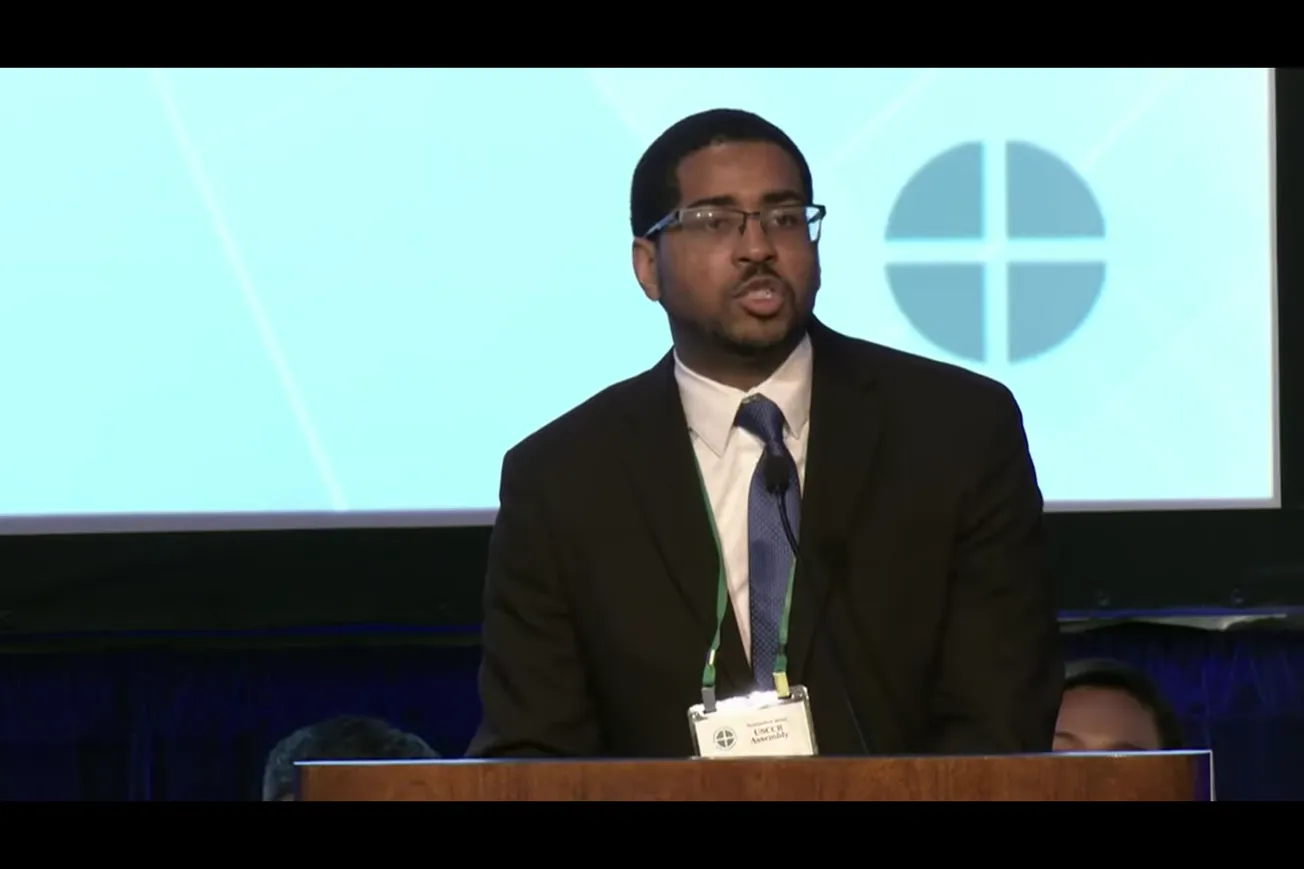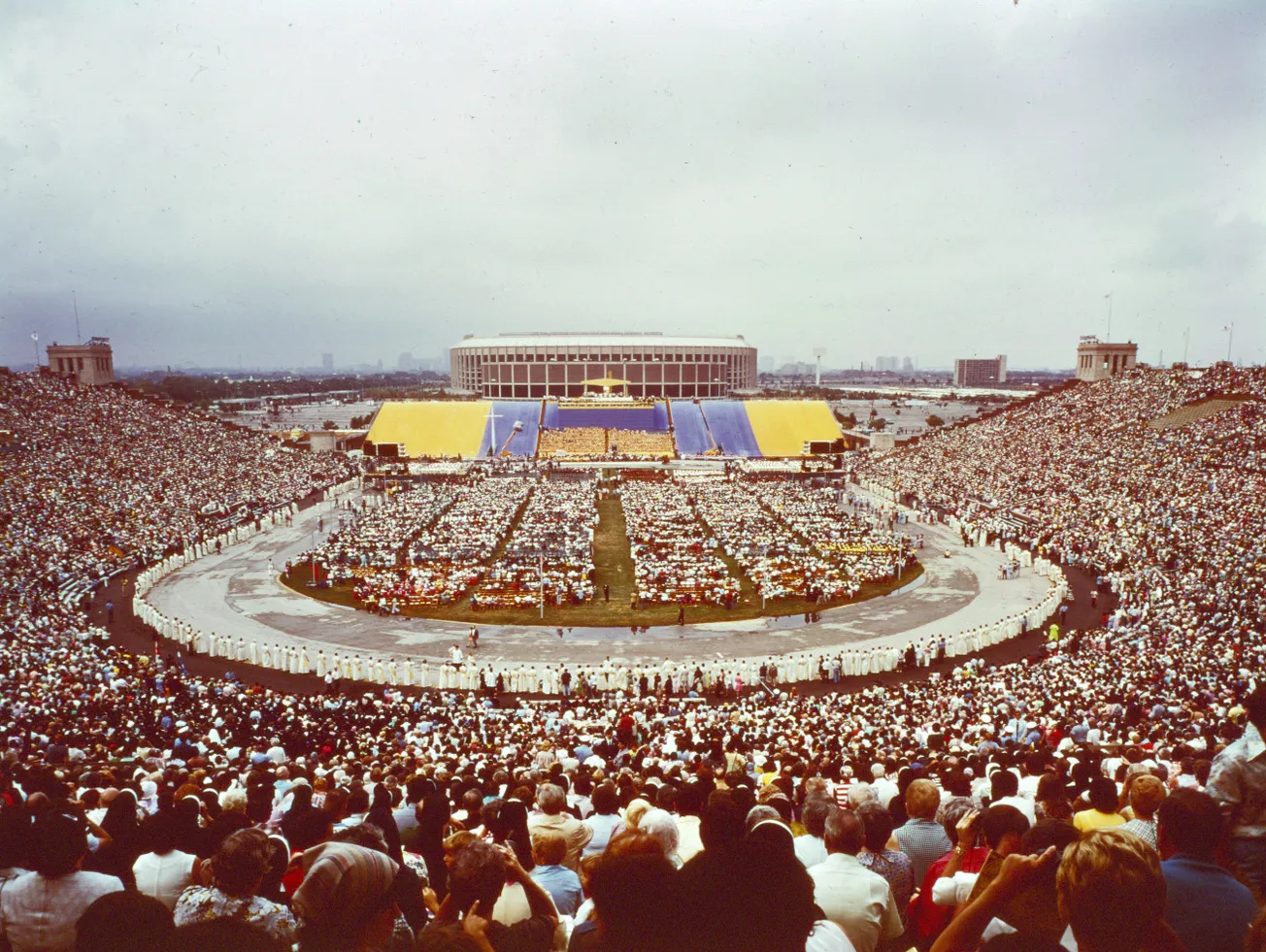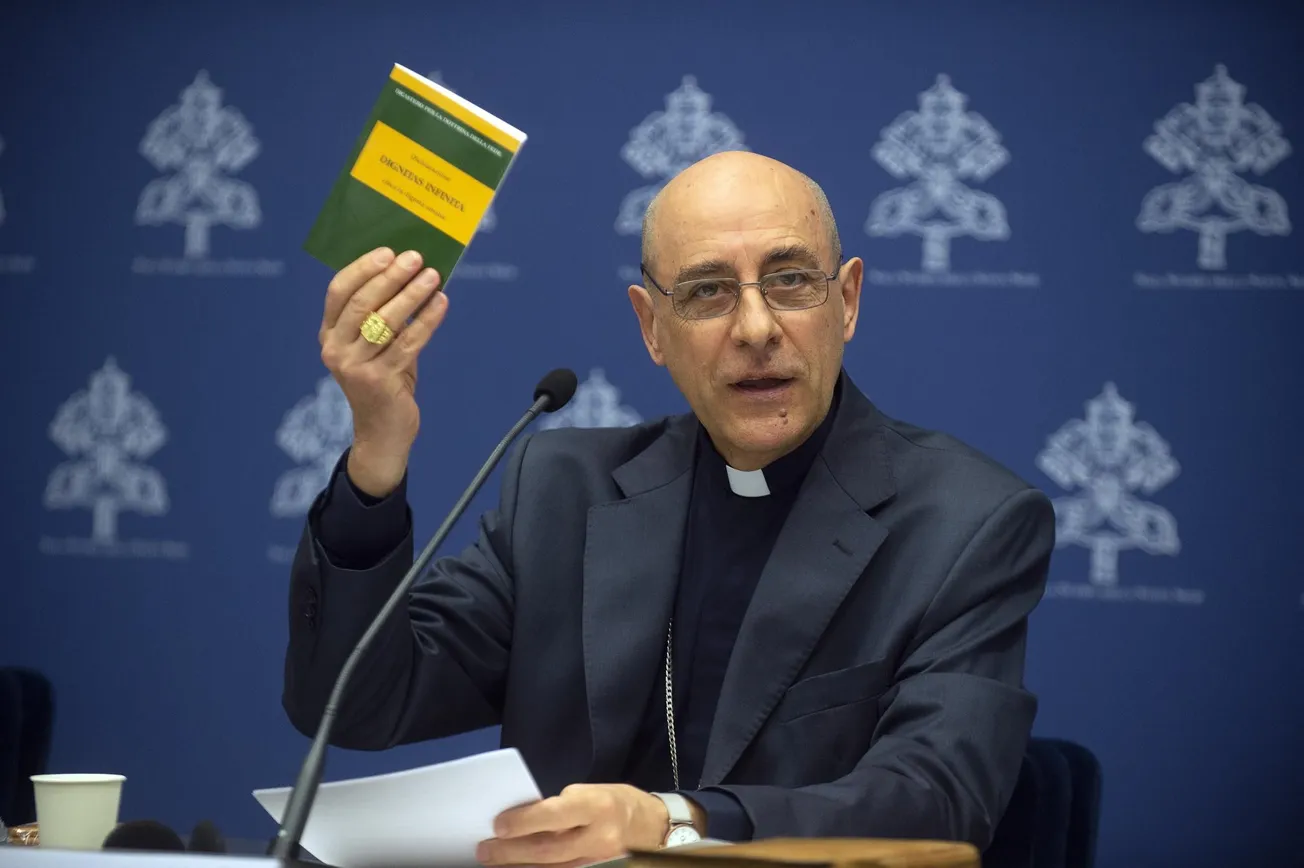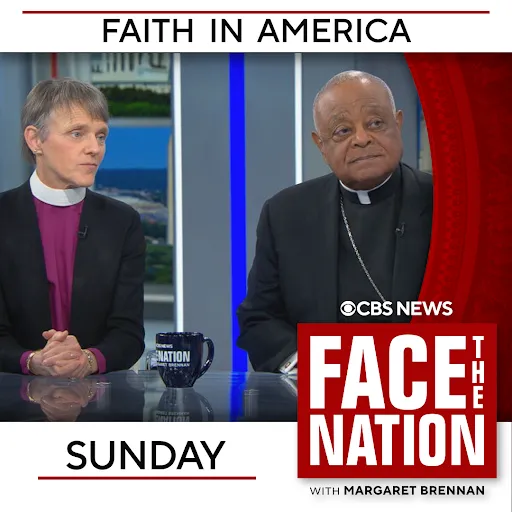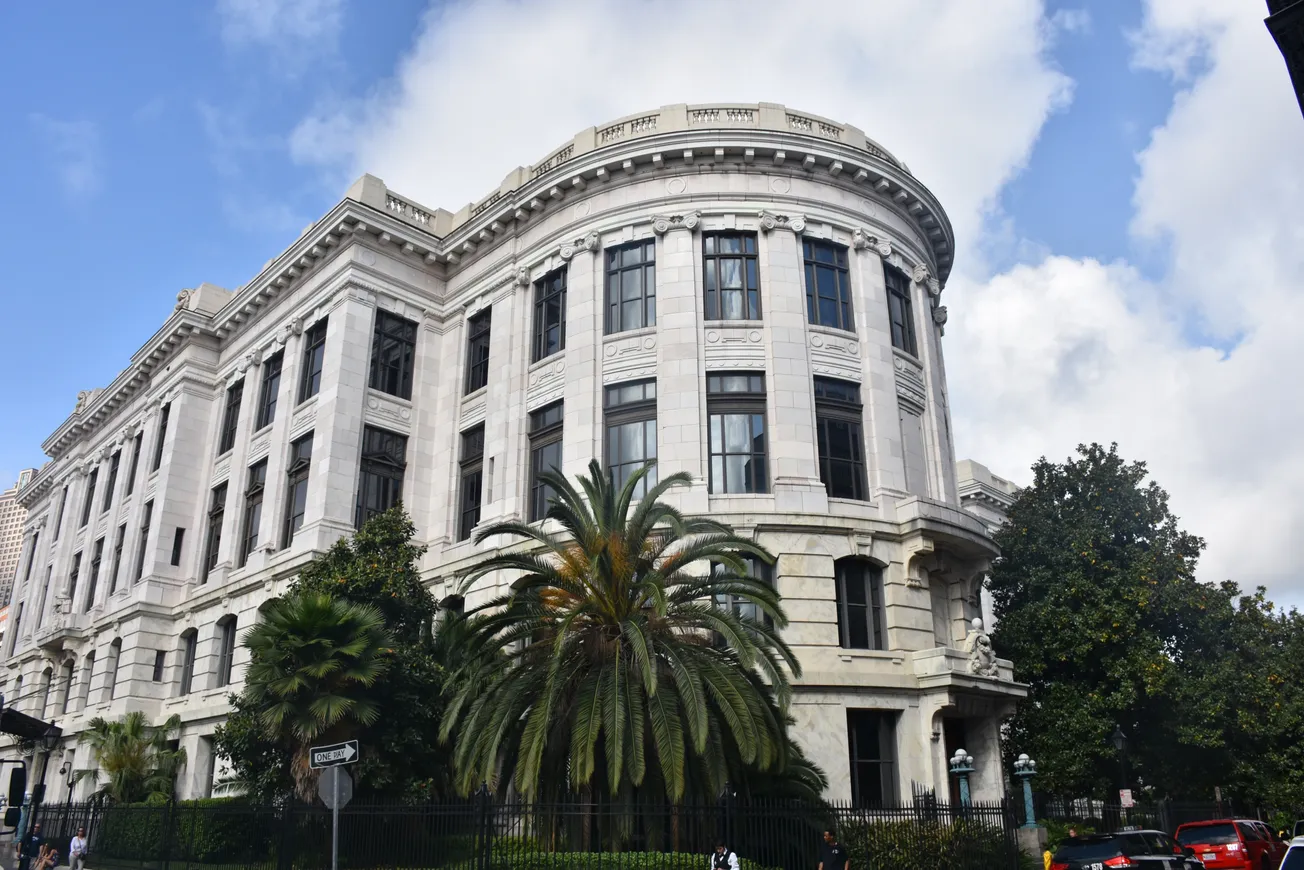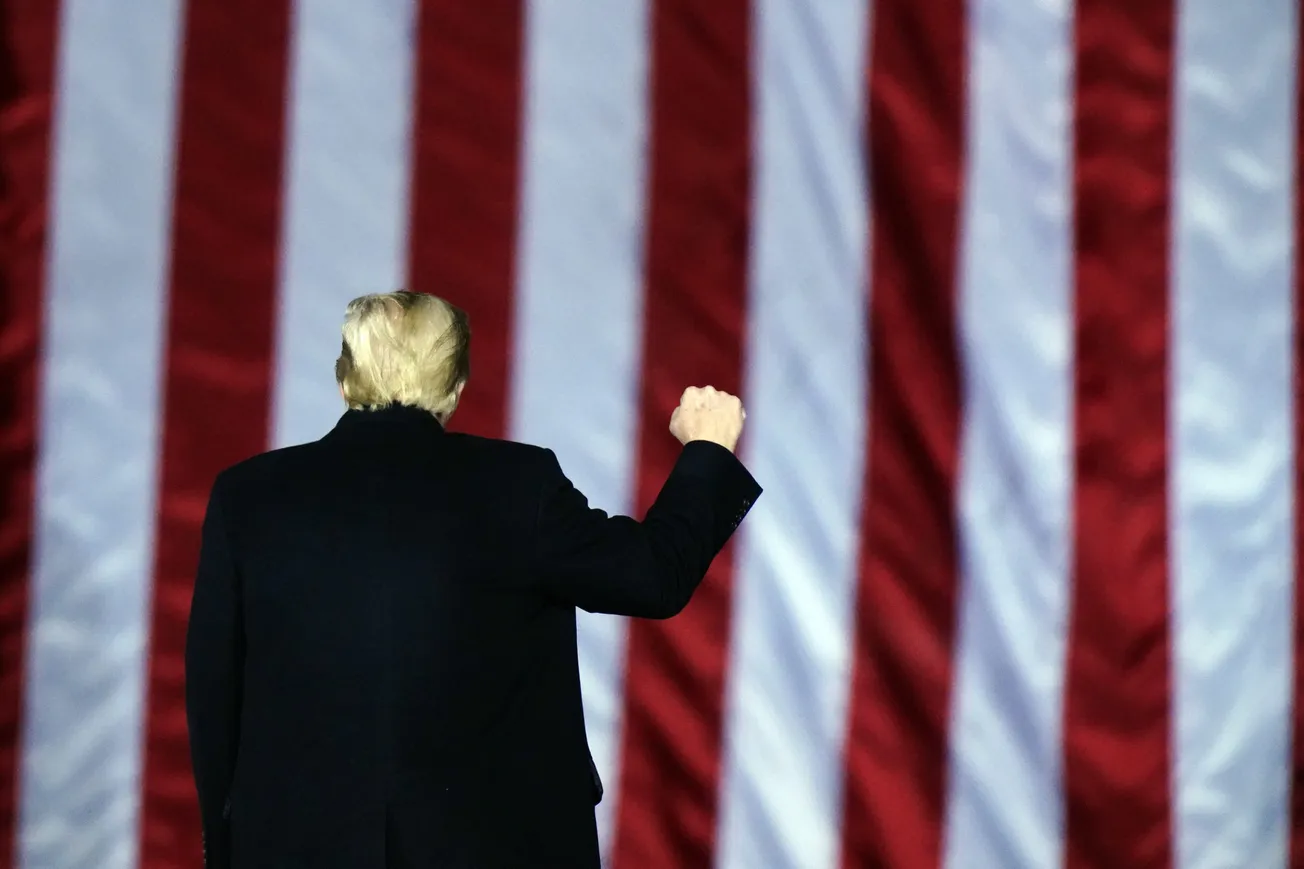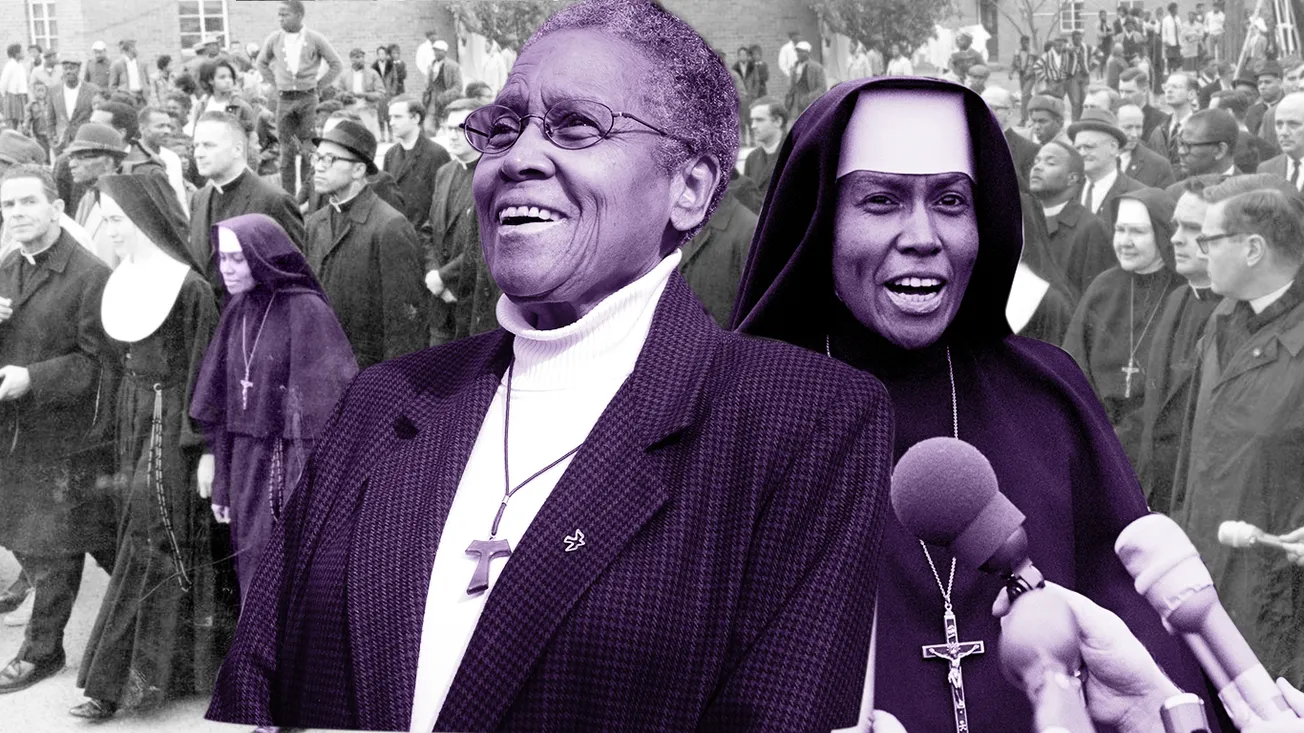All masks were off in more ways than one at this year’s Fall General Assembly of the US Conference of Catholic Bishops, punctuated by a controversial election, technological snafus, and a number of crystal-clear messages to the Vatican that will likely cause sparks to fly for years to come.
At the head of the weeklong meeting’s livestreamed public sessions in Baltimore, beginning Tuesday afternoon, the conference’s newest members were welcomed by outgoing president Archbishop José H. Gómez of Los Angeles, including a Black prelate in Jacques Fabre-Jeune, CS of Charleston.
With one exception, no Black Americans would grace the ballroom stage again, nor step to the mic for comments, questions, or commendations. In what seems to be something of a tradition, the Black episcopal voice in the USCCB was mute during its flagship gathering.
Rudy Dehaney, a lay Black Catholic speaking in his native Baltimore, took to the stage for a presentation on the bishops’ “Journeying Together” intercultural young adults initiative, which hosted an in-person event in Chicago last summer. His comments, delivered on Wednesday morning, were a highlight of the two-day public sessions and described marginalization felt even during the 2021 JT gathering (which included several bishops).
“This was not the first and only time that we have felt this way in church spaces, as this happens all the time it's not even unique to our culture. You can say that you get used to it, but you really don't. You do learn, however, to live with that expectation that nothing will really change,” he said.
“We all carry our own experiences, histories, challenges, and gifts from God that we bring to this Church—waiting to be in a relationship with our leaders, to truly know that we all are welcome served and loved by God, to see the recognition and dismantling of systems of racism, violence, and marginalization wherever they occur, and hearing our stories told.”
Rudy Dehaney recounts that, during the #JourneyingTogether gathering in Chicago, gospel music was initially left out of the week's liturgies.
— Nate Tinner-Williams 🇻🇦✊🏾🌹 (@natemup) November 16, 2022
He says this kind of experience was not new for the Black Catholics present.
Livestream: https://t.co/FCZfjkozth#USCCB22 pic.twitter.com/RmkEvq5eJw
Dehaney's was a powerful message that more than one bishop later commended to me privately, but I wondered why it was left to a young layman (and his female counterpart, Cecilia Flores) to bring these issues to the fore. Multiple presentations from bishops covered conservative talking points such as abortion ad nauseam; I hoped for the Church’s fuller social teachings to receive similar attention, and perhaps from Black bishops who themselves come from the margins, but I was left disappointed.
There could be a number of reasons for this, including the fact that three of the nation’s seven active Black Catholic bishops will reach the mandatory retirement age within the next six months. (Two of them turn 75 within the next three weeks.)
They know the drill. Even the strongest address to the USCCB from a Black Catholic, like Servant of God Thea Bowman’s in 1989—which, ironically enough, received high commendation on Tuesday from Archbishop Gómez—has not resulted in a sea change of anti-racism within their ranks some three decades later. So why bother?
And perhaps “drill” is a uniquely apt word, as the top news from this year’s meeting was Tuesday's third-ballot election of Archbishop Timothy Broglio of Military Services as the new USCCB president. There was always the possibility that a hardline conservative in Gómez’s vein would be the pick, but I had not anticipated that it could be someone worse.
Among his apparent laundry list of actions in contradiction to Pope Francis and the Vatican in recent years, Broglio was infamously noted last year as supporting religious exemptions for his flock concerning the COVID-19 vaccines (which bishops of his ilk were unhesitant to link to abortion and religious freedom). Though Rome made clear that there exists no Catholic teaching in support of avoiding the shot, Broglio moved in step with US political conservatives instead.
It was not the first time, of course. Broglio has also allied himself—as recently as Tuesday evening, following his election—with conspiracy theories related to LGBTQ+ persons, namely that they are to blame (at least in part) for the Catholic child sex abuse crisis. Unsurprisingly, he has also opposed such persons serving in the military.
Archbishop Timothy Broglio of the Archdiocese for the Military Services has been elected president of the US Conference of Catholic Bishops.
— Nate Tinner-Williams 🇻🇦✊🏾🌹 (@natemup) November 15, 2022
The 70-year-old prelate notably supported vaccine exemptions for his flock last year.
Livestream: https://t.co/jSXLwfMbd4#USCCB22 pic.twitter.com/sOvSbS0MIO
For the next several years, Broglio will be one of the major faces of the US Catholic Church. On the one hand, it’s frustrating, and on the other it was inevitable. The failure last November of the USCCB majority to push through an official document censuring pro-choice politicians—the votes weren’t there—seems to have culminated in a much different strategy, mirroring the political machinations of the secular world.
Indeed, if politics is downstream of culture, it would appear that the Church hierarchy is further still.
This was evident from the opening address of the conference, from the USCCB leadership to the papal delegate, featuring repeated odes to the “culture of life” and defense of the unborn, a stubborn focus that Rome has in various ways recommended against. Apostolic nuncio Archbishop Christophe Pierre responded with a speech on Pope Francis’ behalf, promoting “closeness” to the laity, the Church as a “field hospital,” and all but warning the bishops to tread lightly.
That their leaders did not—electing Broglio, rejecting calls from within the conference to update their 2007 “Forming Faithful Consciences” document to reflect modern struggles against racism and insurrection, and continuing their attempts to shoehorn the now-launched National Eucharistic Revival into the ethos of Pope Francis.
Impassioned addresses on the child sex abuse crisis from survivor Mark Joseph Williams and Cardinal Joseph W. Tobin, CSsR of Newark, and a briefing on the Vatican’s 2023 Synod on Synodality from Bishop Daniel E. Flores of Brownsville provided much-needed respite—and more realistic links to a Francis-aligned agenda—but it was perhaps too little, too late.
Even organizations like Catholic Relief Services, which presented twice during the public sessions, fell flat in some ways, with self-congratulatory remarks on work in war-torn Ethiopia, for example, failing to mention the region’s long, unresolved history with Vatican-endorsed colonialism and brutality. (To my shame, I learned of this history after the fact—from my Uber driver, of all people.)
Also, perhaps the timing was off, but while a possible sainthood cause for a Boston-born Black Franciscan friar struggles to gain steam stateside, the bishops on Wednesday afternoon moved to support canonization efforts for three White women. Notably, these include Servant of God Margaret Mary Healy Murphy, who multiple historians say owned slaves.
An interesting turn of events, but perhaps not unexpected. Three historians in particular made the claim that Murphy owned slaves, and the Holy Ghost Sisters' archivist has told me they were mistaken. https://t.co/Gyj5iRZKiF
— Nate Tinner-Williams 🇻🇦✊🏾🌹 (@natemup) November 16, 2022
Moreover, while no mention was made during the public sessions that the USCCB meeting was taking place during Black Catholic History Month, a suggestion was made at one point by Bishop Joseph Strickland of Tyler—one of the nation’s most outspokenly GOP-aligned prelates—that November be named Faithful Citizenship Month. Thankfully, it is unlikely that such an idea will ever reach a vote.
It remains a possibility, however, that prelates like Strickland are in fact the future of the US bishops’ conference. It remains a possibility that President Broglio—who praised former president Donald Trump’s decision to ban transgender persons from the military—will serve well into Trump’s latest presidential campaign, announced on the same day Broglio was elected. It remains a possibility that nary a word spoken from the Chair of Peter will consequentially shape the outlook of many of those to whom we Americans answer as pastors of our pastors.
More than possible, it’s likely that roughly half of the nation's currently active Black Catholic bishops—most of whom are openly aligned with Pope Francis’ vision for the Church—will no longer be in office by the time the USCCB meets again in summer 2023 for its next general assembly.
As they meet today privately for the final sessions of their Baltimore gathering, the world looks on with a critical eye to see what could come next.
Quite frankly, I’m not sure I want to know.
Nate Tinner-Williams is co-founder and editor of Black Catholic Messenger, a seminarian with the Josephites, and a ThM student with the Institute for Black Catholic Studies at Xavier University of Louisiana (XULA).


